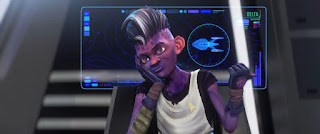My holiday week off from blogging (and my 2021 recap posts) has put me several episodes behind on Star Trek: Discovery. But yes, I'm still watching the show, and I'll pick up from where I left off with my thoughts on "The Examples."
The Dark Matter Anomaly threatens a chain of asteroids, and Discovery must help with the evacuation efforts... which includes a half dozen prisoners serving life sentences that the local government wants to leave for dead. Meanwhile, it has been determined that the DMA is not a naturally occurring phenomenon, and it can move seemingly to anywhere at any time. So efforts to study it step up, and Stamets is forced to work with surly scientist Ruon Tarka, the man working on "Spore Drive 2.0," who has pointedly avoided interactions with Stamets so far.
This episode has plenty of good old-fashioned Star Trek morality on display. A society with "life in prison as the only punishment for crime" is such a classic Trek notion, even though it's never been done in exactly this way (I think). The arc of redemption for the prisoner Felix was a nice one, and also a form of Trek idealism: the "worst of the worst" can still reform. Plus, Burnham gets to cap the episode with a righteous lecture -- pointing out that Akaali will now be reliant on the kind of mercy they've previous refused to show their own people.
But the structure supporting all these ideas didn't completely work for me. Trek Ethics 101 dictates that "the needs of the many outweigh the needs of the few." And I don't think the writers did a good job making clear that for sure, the characters had everything well in hand evacuating everyone else from these asteroids before turning to the six people that would be hardest to rescue.
As for the larger rescue, having Rhys lead it (off screen) felt extremely awkward to me. Discovery as a series has made the bridge crew characters so anonymous -- and has established such a distinct formula when actually dealing with them -- that any time someone gets a back story, you immediately suspect they'll be killed by the end of the episode. I'm not a fan of that trope. While, thankfully, the writers weren't actually doing it here, the way they wedged in Rhys' past tragedy felt pretty cumbersome. (Also, how are homes being destroyed in hurricanes in a future with global weather modification technology?)
I also found it awkward how suddenly the ship's computer Zora developed emotions. The quasi-sentient "Sphere data" has been a thing for more than a season now, but visited so infrequently that you'd be forgiven for forgetting about it. With serialized storytelling as the bread and butter of Star Trek: Discovery, I would have expected a more graceful and gradual introduction of this majorly important development.
But then, "gradual" isn't the name of the game in this episode. While the urgency of understanding the anomaly is clear in general, it isn't really explained why the experiment in engineering has to happen right now, in these next four hours. If lack of available power is an issue, can't they just wait until after the rescue, then tap into the transporter power that was previously unavailable? Or, I don't know, chain a bunch of ships together somehow to run a full test of Tarka's model?
Still, the subplot does serve up some good moments. I thought Tarka's disdain for Stamets would be grounded in the fact that he's from a millennia in the past -- what would someone from the Dark Ages possibly have to teach Tarka? But as logical as that might have been, it was also fun that Tarka really just has worse interpersonal skills than first season Stamets. (How far Stamets has come.) We got more razor sharp wit from Tig Notaro as Jet Reno too, always welcome. (And especially needed when Tilly's no longer around. Yeah, I continue to feel that her absence is going to be a real blow to the series.)
I liked everything with Culber's story line. It's worth never forgetting that he died and came back to life, and Kovich sizing up Culber's "savior complex" so completely was a great way to bring that background back to the foreground. Star Trek has not always done well at examining the consequences of major events, but the format of Discovery does allow for it, and I'm glad the writers are embracing it. I also enjoyed the insight that Culber and Stamets are both workaholics, and that it might be part of their strong bond.
Plus, as always, we got plenty of cool visuals: the asteroids being devoured, the creepy bug/bomb/buzzsaw creatures, the stark landscape around the prison. Even if the narrative ideas didn't always feel clear to me this episode, the effects team on Discovery hits a grand slam almost every time at bat.
I'd give "The Examples" a B-. I think it was the weakest episode of season four so far, though it's a necessary link of the overall narrative chain.



















